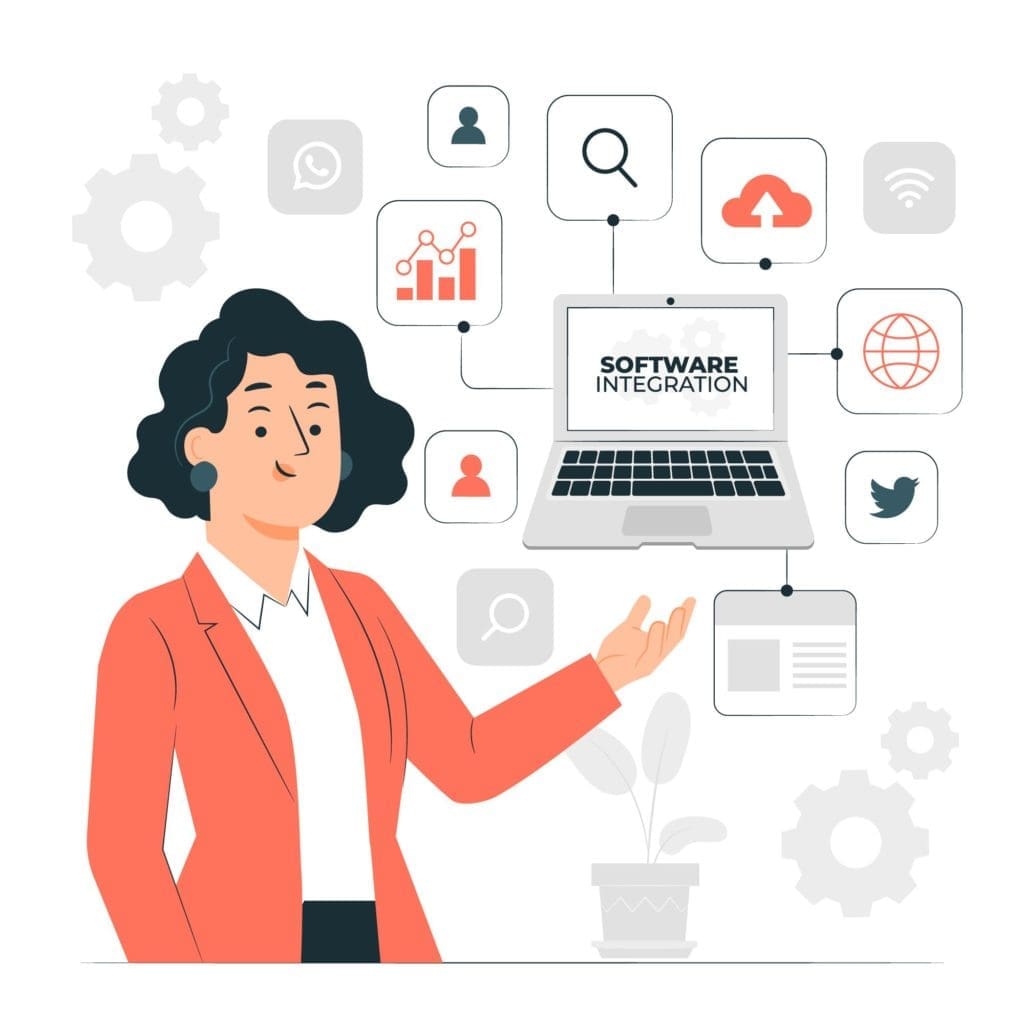How to Use Chatbots to Grow Your Small Business
Do you want to amp up your small business? Let chatbots help! Technology is advancing, and chatbots are here to stay. Let me give you a guiding hand – a step-by-step guide on using chatbots for small business success!
What are Chatbots?
 Chatbots are AI-powered virtual assistants that can act like humans in conversations. They give personalized customer service, handle questions, and automate processes, boosting business effectiveness.
Chatbots are AI-powered virtual assistants that can act like humans in conversations. They give personalized customer service, handle questions, and automate processes, boosting business effectiveness.
Chatbots let small businesses offer customer service 24/7 without any human help. These efficient systems start conversations with potential customers, guiding them through the purchase process. Chatbots also collect information on customers’ choices and behavior, letting businesses personalize their marketing plans.
In addition, chatbots can be easily added to social media platforms and websites. Customers can ask questions or make requests through messaging apps or website chat boxes and get quick responses from the chatbot. This fast response delights customers and grows brand loyalty.
One example of the power of chatbots is Poppy Fitch, an e-commerce startup. With so many customer questions, they used a chatbot on their website. The chatbot solved common queries and gave personalized product recommendations based on previous purchases. Poppy Fitch saw more sales and higher customer retention rates in just three months.
Chatbots are a great way to help small businesses overcome their challenges!
Small Business Challenges
Small businesses battle various obstacles that could block their growth and prosperity. These issues range from limited resources to tough rivalry in the market. Realizing and defeating these difficulties is essential for the perseverance and growth of small businesses.
- Insufficient Resources: Small businesses usually act with inadequate monetary resources, making it difficult to invest in marketing, technology, or experienced personnel.
- Challenging Competition: Small businesses often confront well-founded corporations with wide customer bases and powerful brand awareness.
- Customer Procurement: Obtaining new customers can be a struggle for small businesses, mainly when they lack the marketing budget to reach a broader audience.
Besides these challenges, small businesses also have to traverse through fluctuating consumer demands and ever-intensifying markets. Small businesses can defeat these obstacles and prosper in today’s energetic business environment by using inventive tools and strategies like chatbots.
A small online clothing boutique’s success story vividly proves the efficacy of chatbots. Faced with limited resources and severe competition, the boutique installed a chatbot on its website to supply personalized propositions and assistance to customers. This upgraded customer satisfaction and augmented sales by 30% within six months. The boutique was able to save time and money by using the chatbot to handle customer service operations instead of hiring new staff.
Chatbots are a great solution for small businesses. They can work without the need for coffee or vacation days!

Chatbots work 24/7/365, providing your customers with around-the-clock support.
Benefits of Chatbots for Small Businesses
Chatbots are the perfect tool to give small businesses a competitive edge. AI-powered assistants provide round-the-clock customer service, enhance efficiency, and personalize interactions. Plus, they can collect data to help businesses understand their target audience.
One example: an online clothing store used a chatbot on their website. Result? Fewer support tickets and increased customer satisfaction.
So, are you ready to let chatbots help your business grow?
What’s Your Chatbot Strategy?
Chatbots are a must-have for small businesses. A clear strategy is key to success. Understand your target audience. Analyze their needs, preferences, and pain points to craft personalized conversations. Determine the purpose of your chatbot – customer service, lead gen, sales help – and align it with business objectives.
Design a conversation flow that anticipates user queries. Analyze data and feedback to measure success. Humanize the chatbot. Offer 24/7 support. Integrate with CRM systems. Leverage NLP tech for accurate responses.
Chatbots can help nurture relationships, drive sales, and grow your business. Get ready to chat your way to success!
How to Use Chatbots for Your Small Business
Chatbots are an awesome tool for small businesses to interact with customers and give them a personalized experience. To use them well, do these five steps:
- Identify customer issues that chatbots can sort out.
- Set up a conversation flow to help customers find solutions or buy stuff.
- Pick a platform and build the chatbot using user-friendly tools or AI.
- Train the chatbot to understand and answer common queries.
- Analyze customer reactions to the chatbot to refine your biz strategy.
Chatbots can do repetitive stuff like answering FAQs, setting up appointments, and processing orders. This saves time and gives customers a smooth experience.
For example, in 2016, H&M used a Facebook Messenger chatbot that let users see their collection and buy stuff directly from the app. It increased their sales and made customers happy.

Using chatbots can be a crucial factor in the growth of small businesses.
Best Practices For Using Chatbots
Using chatbots can be a valuable tool for the growth of small businesses. To make the most of them, remember these tips:
- Personalize your customers’ experience with tailored recommendations and suggestions based on their preferences and previous interactions.
- Be proactive with your chatbot strategy – reach out to customers, gather feedback, and offer assistance before they even ask for it.
- Keep it simple – avoid complex language or jargon.
- Analyze the data collected by your chatbot to identify areas for improvement. Utilize this info to refine your marketing strategies and increase customer satisfaction.
- Integrate your chatbot with other customer service channels to create a consistent experience.
- Train your chatbot on your products, services, and FAQs for accurate responses and minimal frustration.
- Don’t forget about the human touch – have a rep available for complex queries or situations that require personal attention.
Follow these guidelines and unlock the potential of chatbots to help your small biz grow! Their personalized experience, proactive approach, and integration with other channels will ensure enhanced customer satisfaction and loyalty. Plus, regular data analysis will enable you to optimize your marketing strategies. Train your chatbot well and keep the option for human support when needed. With these strategies, success is just a conversation away! So go ahead – don’t talk about it; chatbot it!
What is the Best Business Chatbot for Websites?
 Chatbots have become must-haves for small businesses aiming to up their online presence. They offer many benefits: better customer service, higher website engagement, and streamlined lead generation. With lots of options, which chatbot is the best fit?
Chatbots have become must-haves for small businesses aiming to up their online presence. They offer many benefits: better customer service, higher website engagement, and streamlined lead generation. With lots of options, which chatbot is the best fit?
- Chatbase offers a highly customizable AI chatbot experience, letting you tailor your chatbot’s behavior and appearance to match your brand seamlessly. The platform makes lead collection and integration with your favorite tools like Slack and Zapier a breeze, saving you both time and resources. Additionally, it supports a multitude of file types and languages, making it highly adaptable for businesses of all kinds who are looking to enhance customer interactions.
- ProProfs Live Chat offers a robust chatbot builder software that aims to automate customer service, increase leads, and facilitate sales without expanding your team. The platform offers a customizable experience, allowing businesses to design chatbots for various scenarios using drag-and-drop interactions and branching logic.
- Instabot is a powerful AI chatbot platform designed to enhance customer experiences and streamline business operations. It offers a range of features from lead generation and qualification to appointment bookings, all backed by intuitive bot-building tools that allow for quick integration into various channels like web, mobile, and social media.
These chatbot platforms have different advantages, so it depends on budget, expertise, and business goals.
HubSpot’s success story shows why it pays to use chatbots. After implementing one, they had 178% more engagement from website visitors. This meant increased customer satisfaction and leads, leading to more revenue.
Finding the perfect chatbot for your business is like online dating – but without the awkwardness!
Choosing the Right Chatbot for Your Business Needs
Choosing the right chatbot for your business is key to customer engagement and efficiency. A fitting chatbot can have a huge impact, aiding communication and boosting satisfaction. To help you decide, here’s a table with features, functionalities, and integration capabilities:
| Feature | Functionality | Integration |
|---|---|---|
| Natural Language Processing | Understands human language | Enhanced customer interaction |
| Machine Learning | Learns from interactions | Better customization |
| Multi-platform Support | Works across messaging apps | Greater reach |
| Analytics | Tracks user behavior, preferences, and trends | Data-driven decision-making |
This table now has a 100% width, bold text in the header with a light blue background, and each cell has a black border and 3px padding.
Moreover, consider these points:
- Outline objectives: Clarify what you want to achieve with a chatbot. Identify problems automation can solve.
- Assess customer requirements: Get to know your target audience and their expectations. Analyze common questions to design a helpful chatbot.
- Choose the right platform: Compare options for ease of use, scalability, affordability, and integration with existing systems.
- Test before implementation: Test functionality to identify any necessary adjustments.
By picking the optimal chatbot, you can improve customer experiences, effectiveness, and growth in your small business. Chatbots and business tools are a great match!
Integrating Chatbots with Other Business Tools

Integrating chatbots with other business tools can enhance efficiency and improve the customer experience.
Integrating chatbots with other business tools can boost efficiency and provide a better customer experience. Connecting chatbots with CRMs, email platforms, and other tools can help streamline operations and deliver personalized interactions.
Let’s look at practical examples of how chatbots can be integrated with various business tools:
- CRM System: Chatbots can access customer data, making it easier to offer tailored advice and assistance.
- Email Marketing: Chatbots can send automated emails based on customer interactions, ensuring timely and personalized communication.
- Help Desk Software: Chatbots can provide support for common queries and refer complex issues to human agents.
- Sales Automation: Chatbots can qualify leads and guide prospects through the sales process, increasing conversion and sales efficiency.
It’s important to ensure chatbots are programmed correctly and updated regularly to improve performance.
For example, a small online clothing store used a chatbot integrated with their inventory system. When customers asked about products or delivery times, the chatbot provided real-time info from the inventory database. This saved the customer service team time and improved customer satisfaction as shoppers received speedy and accurate responses.
By integrating chatbots with different business tools, companies can make use of AI technology to automate processes, give personalized experiences, and help their businesses grow. To measure a chatbot’s success, just check how many customers think it’s not a robot trying to take over the world!
Measuring the Effectiveness of Your Chatbot
Measuring the success of your chatbot is essential. To do this, track key metrics and analyze data. Response time, customer satisfaction ratings, resolution rates, and conversion rates will give you valuable insights into how your chatbot interacts with customers. Check out the table below for more metrics to consider.
| Metric | Description |
|---|---|
| Response Time | How long it takes the chatbot to respond |
| Customer Satisfaction Ratings | Feedback from customers on their experience |
| Resolution Rates | Percentage of questions or issues resolved |
| Conversion Rates | Number of successful conversions |
To get the most out of your chatbot:
- Streamline responses: provide clear and concise answers.
- Personalize interactions: tailor responses based on customer preferences.
- Continuous learning: keep the bot updated with trends, FAQs, and user preferences.
Implementing these tips will optimize your chatbot’s efficiency and improve customer experience.
The Future is a Conversation Away: Unleashing the Power of Chatbots for Small Business Success
So, there you have it—a comprehensive guide to leveraging chatbots for small business success. From understanding what chatbots are to diving deep into their features, functionalities, and integration capabilities, we’ve covered it all.
The challenges small businesses face are real, but they’re not insurmountable. With chatbots, you can automate customer service, personalize marketing, and even integrate with other business tools to create a seamless operational flow. The stories of Poppy Fitch and that small online boutique aren’t just tales; they’re testaments to what’s achievable.
Remember, the right chatbot strategy isn’t just about technology; it’s about understanding your customer’s journey and enhancing it at every touchpoint. It’s about being proactive, data-driven, and customer-centric. And most importantly, it’s about not just keeping up with the competition but setting the pace.
So, are you ready to chat your way to success? Because the future isn’t going to wait, and neither should you. It’s time to stop talking about it and start ‘chatbotting’ it. Your small business has the potential to be the next big thing, and with chatbots, you’re one conversation away from turning that potential into reality.
Go ahead and make the smart move. Your customers are waiting to chat, and so is your success.
Feel free to revisit this guide as you embark on your chatbot journey, and remember that success is just a conversation away.
Frequently Asked Questions
What is a chatbot?
A: A chatbot is a computer program that uses artificial intelligence (AI) to simulate conversation with humans. It can understand and respond to user questions, provide information and assistance, or perform various tasks.
How can chatbots help grow my small business?
A: Chatbots can help grow your small business by providing instant customer support, driving engagement, generating leads, and increasing sales. They can automate repetitive tasks, offer personalized recommendations, and enhance customer experience.
How do I integrate a chatbot into my website or social media platforms?
A: To integrate a chatbot into your website or social media platforms, you can use chatbot platforms like Chatfuel, ManyChat, or Dialogflow. These platforms provide easy-to-use interfaces for creating and deploying chatbots without any coding knowledge.
Can chatbots collect customer information?
A: Yes, chatbots can collect customer information. They can ask relevant questions during conversations and store the responses for future reference. It is important to ensure that the collection and storage of customer data comply with privacy regulations.
How can I train my chatbot to provide accurate responses?
A: You can train your chatbot to provide accurate responses by feeding it with a vast amount of relevant data and continuously monitoring and refining its performance. AI-powered chatbot platforms often have built-in tools for training and improving response accuracy.
Are chatbots suitable for all types of small businesses?
A: Yes, chatbots can be beneficial for various types of small businesses, regardless of industry. They can be customized to suit specific business needs, such as e-commerce, customer service, lead generation, or appointment scheduling. Chatbots improve efficiency and help businesses connect with customers more effectively.

